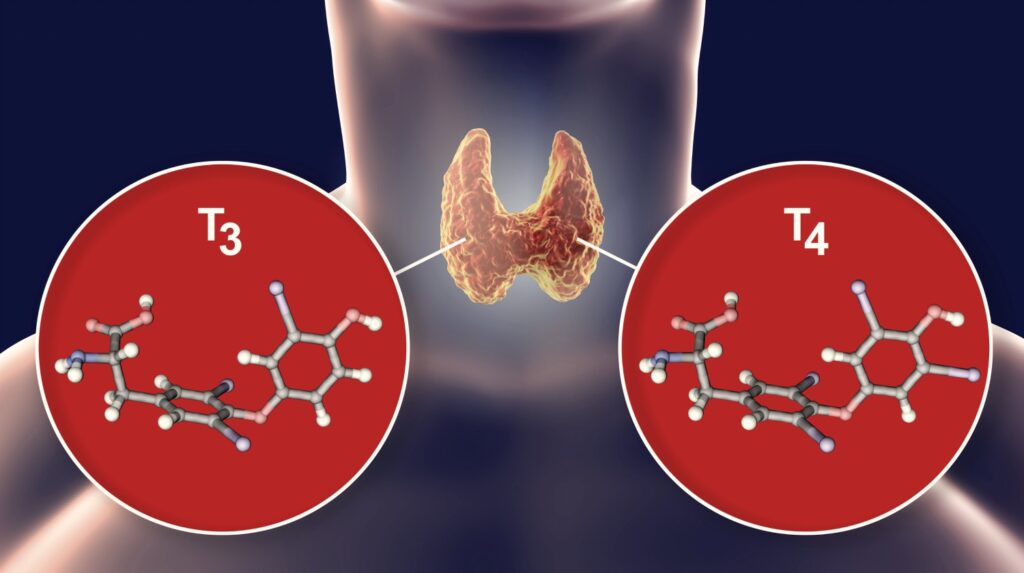How Thyroid Disorders Affect Conception (Pregnancy)

Dr. Kuldip Chaudhuri
Department of Medicine
Institute of Human Reproduction
When planning a pregnancy, you need to examine this important organ – the thyroid gland in order to avoid complications during pregnancy. Does the thyroid gland affect conception? And how do thyroid hormones affect conception? These questions are most common in those women who have any pathology of this gland.
The thyroid gland and its effect on the body
The thyroid gland is an unpaired endocrine gland that sits on the front of the neck and resembles a butterfly. Normally, it is not visualized with the naked eye, but it can be palpated. The thyroid gland is responsible in the body for the synthesis of two hormones – T3 (triiodothyronine), T4 (thyroxine).
These hormones are iodine-containing, therefore, for their normal synthesis, a sufficient intake of iodine in the body with food and water is necessary.
Thyroid hormones affect virtually all organ systems in the human body. The reproductive system is no exception, therefore, when planning a pregnancy, it is necessary to examine the thyroid gland, as well as correct irregularities in its work if any.
Thyroid and pregnancy
Thyroid hormones, conception, all these are very interconnected, they affect the formation and development of the central nervous system in the unborn baby, and as a result, the level of intelligence. From about the 12th week of pregnancy, the fetus begins to function its own thyroid gland, and until that moment the child is completely dependent on the level of the mother’s thyroid hormones.
It is very interesting that in the first weeks of pregnancy, a woman’s body is normally in a state of physiological hyperthyroidism, most likely this is due to the fact that there should be enough hormones for two. If the pregnancy proceeds in conditions of hypothyroidism, then this can result in complications for the child. These complications include congenital developmental anomalies, mental retardation, deafness, dumbness, strabismus, and others. In the case of hypothyroidism during pregnancy planning, conception itself may be questioned. Therefore, if you cannot get pregnant for a long time, then it is worth visiting a medicine specialist and examining the thyroid gland.
Diseases of the thyroid gland
Diseases of the thyroid gland are divided into three main types: associated with iodine deficiency, hypothyroidism, and hyperthyroidism. Let’s consider each of the types in a little more detail.
Iodine deficiency
Iodine deficiency diseases result from a lack of iodine in the body. When planning a pregnancy, this condition must be corrected, since there may be problems not only with conception but also with bearing such a pregnancy. For the fetus, the lack of iodine in the mother’s body is dangerous with many complications. The Government of India for the benefit of its citizens has made it mandatory to iodize salt before selling it to the general public. Women planning a pregnancy are advised to take iodine-containing preparations, both before pregnancy and after childbirth, for the entire period of breastfeeding.

Hypothyroidism
Hypothyroidism is a condition in which the amount of thyroid hormones in the patient’s blood is reduced. It occurs as a result of autoimmune damage to the thyroid gland, its prompt removal, or a pronounced iodine deficiency in the body.
Clinically, hypothyroidism is manifested by weight gain, edema, lethargy, apathy, decreased appetite, decreased heart rate, brittleness or hair loss, menstrual irregularities, and infertility. It is possible to detect hypothyroidism long before the onset of clinical manifestations by the level of hormones in the patient’s blood. In hypothyroidism, the level of T3 and T4 will be reduced, and the level of TSH will be increased, and the earliest sign is precisely an increase in TSH. The lack of thyroid hormones in a mother during pregnancy can result in the development of congenital malformations, chromosomal abnormalities in the fetus, and even termination of pregnancy. Hence pregnant mothers who have less production of thyroid hormones, i.e. hypothyroidism, need medication throughout pregnancy and even after the delivery of the baby if deemed necessary by the physician.

Hyperthyroidism
In hyperthyroidism, the situation is fundamentally opposite, the level of T3 and T4 is increased, and TSH is reduced.
Clinically, hyperthyroidism is manifested by a sharp decrease in body weight, increased sweating, tremors, irritability, tearfulness, tachycardia, increased blood pressure, enlarged eyeballs, irritable bowel syndrome. How thyroid hormones affect conception and gestation: pregnancy in a state of uncompensated hyperthyroidism is also unsafe, and can be dangerous with a rapid heart rate in the fetus, the threat of interruption, and the development of fetal malformations. With hyperthyroidism, the administration of medicines that decreases the production of thyroid hormones is required for the entire period of pregnancy.

Conclusion
The question of whether the thyroid gland affects conception can be answered in the affirmative, of course, the thyroid gland affects conception. The influence of the thyroid gland on the conception of a child is carried out through the production of hormones. Diseases of the thyroid gland can lead to infertility, problems when carrying a child, therefore, at the stage of planning pregnancy, examination of the thyroid gland is important and any functional irregularities should be corrected, with the involvement of an appropriate specialist.


Very useful n educative guide.
Can you comment on free T4 too in pregnancy?
Free T4 should also be in the reference range in pregnancy. For further queries and clarification, please book a consultation with your physician if you are pregnant and T4 if not in range. T4 if not in range will be corelated with T3, TSH and the respective clinical scenario.